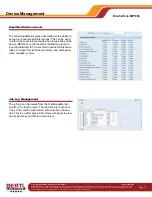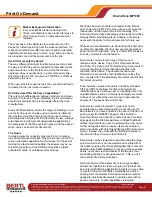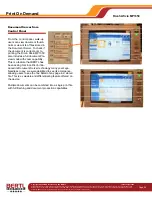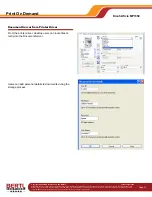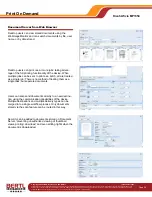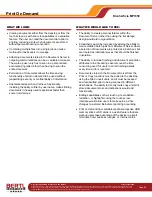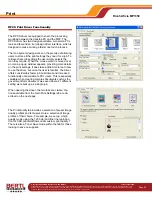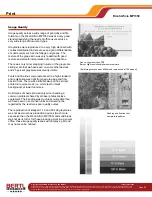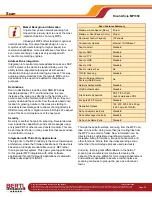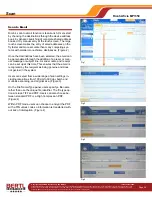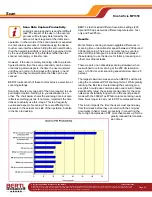
Copyright © 2006 MCA Internet, LLC dba BERTL.
13 November 2006
All Rights Reserved. The license under which this document is made available and applicable law prohibit any reproduction or further transmission of any portion of this document. This
document may only be viewed electronically through the www.BERTL.com Web site and may not be stored in electronic or hard copy format. Any reproduction of trademarks is strictly
prohibited. BERTL accepts no responsibility for any inaccuracies or omissions contained in this document.
Page 30
Ricoh Aficio MP1350
Market Background Information:
Print has replaced copy as the primary
method of creating output years ago. To
limit costs and raise integration between
functions, more multifunction products use
a single processor board for copy, print,
and scan functions.
Connectivity
The vast majority of devices include Ethernet and USB
connectivity out of the box; some include parallel
connections. In addition, most devices offer a selection of
optional connectivity choices like Wireless 802.11b or g (g
is the faster, preferred standard.), Bluetooth for connection
to cell phones or PDAs, and FireWire for high speed local
connectivity.
PDLs
PCL is the de facto printer description language (PDL) of
choice provided by all suppliers. Some bundle in
PostScript (PS) while others charge for an upgrade. A few
manufacturers also include their own PDL, which is based
loosely on the old Windows/GDI printing technology.
These Windows or GDI drivers often offer significant
productivity advantages over traditional PCL/PS drivers
since the bulk of the processing is handled by the more
powerful desktop PC rather than the less well-equipped
printer processor itself.
Productivity
Judging print productivity is an inexact science at best or
misleading at worst. Factors such as processor power,
memory capabilities, spool and RIPping efficiency, engine
throughput speed, RIP while printing capabilities, and
more all play a major part. Most devices fair better from
some of these factors than others, and different workflows
benefit from one factor more than another.
It is easy to play judge and pronounce what determines
productivity. But, it will have little merit when evaluating
print performance for an end user environment. Device A
may print Document 1 faster than Device B. But, Device B
may print Document 2 faster. You cannot determine which
document is the best measure of productivity.
The same is true of network traffic tests where multiple
jobs are submitted at once. By rearranging the order of the
jobs, the productivity of Device A and Device B could
easily be reversed.
BERTL does not restrict its evaluation of print
performance to such tests. It provides information on how
jobs are treated across the various PDLs offered, thus
allowing users to get the best out of the device.
Printer Drivers
Driver design varies enormously from manufacturer to
manufacturer. Most try to keep a common style throughout
their range to reduce learning curves. However, many
have significant design differences between PDLs, which
can raise issues. While many features are common
throughout drivers from all manufacturers, there are some
differentiators, which—while niche benefits in many
instances—can be valuable in the right hands. We
highlight the strengths and weaknesses over the following
pages.
Print Features Summary
CPU
866 MHz w/Print/Scan Kit Type
1350, Fiery EB-135 and Micro-
Press controllers are also available
RAM and Hard Drive
512MB, 320GB (160 GB X 2)
Operating Platforms Supported
Windows 9x, ME, 2000, Server
2003, XP, NT 4.0, Macintosh OS X
or higher, Unix
Printer Drivers
PCL5e/6, RPCS, optional Adobe
PostScript 3, Direct PDF
Network Protocols
IPX/SPX , TCP/IP, Ethertalk
Interfaces / Standard
10BaseT/100BaseTX Ethernet,
USB 2.0
Client Software
DeskTopBinder v2, SmartDe-
viceMonitor, WebSmartDeviceMo-
nitor, WebImageMonitor
Std PCL Fonts Supported
59
Std PS Fonts Supported
136
Interfaces / Options
802.11b Wireless, USB, Gigabit
Ethernet, Bluetooth, 1394 FireWire,
Parallel, USB Hub.


